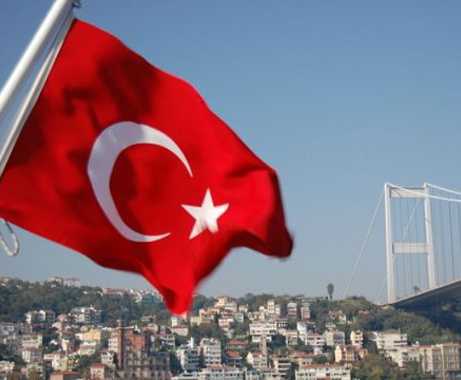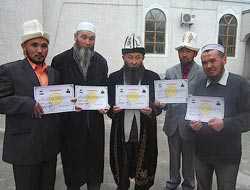Cairo asks Interpol to extradite three Hizballah operatives 29 April: The three Hizballah operatives are wanted in Egypt for subversion, terror, espionage against Egypt, Jordan and Israel. DEBKAfile names one of the trio as Mohammed Qabalan, chief of Hizballah’s clandestine “Israel Perimeter” division.
International Hariri tribunal self-destructs by freeing 4 leading Lebanese suspects. Assad wins after all 29 April: By setting the key witnesses, four pro-Syrian Lebanese generals, free, the pre-trial judge Daniel Fransen Wednesday, April 29, effectively scrapped the international tribunal’s mission to pursue the murderers of former Lebanese prime minister Rafiq Hariri.
The four pro-Syrian Lebanese generals, now under “under strict security for their own safety,” were held in custody for four years on suspicion of complicity in the 2005 Hariri murder in close alignment with Syrian military intelligence, which then ruled Beirut, and with figures close to Syrian president Bashar Assad.
Their release “for lack of sufficient evidence”, according to Fransen, rewarded Assad for the extraordinary efforts he made to quash the international legal proceedings for fear of compromising his close circle in one of the most outrageous political crimes in recent Middle East history.
Our counter-terror sources note that the chance of ever bringing any of these assassins to justice has just been reduced to zero by the international judge’s action. He has cut the main sources of evidence leading to the culprits in Damascus.
A major barrier to Bashar Assad’s international rehabilitation has been removed.
April 29 briefs– Human rights NGO slams Palestinian court’s sentence to death by hanging of man who sold West Bank land to Israelis.
– Obama greets Israel on 61st Independence Day.
He promises to promote shared interests including peace.
– President Peres awards certificates of excellence to 120 outstanding officers and soldiers.
– George Brown visits Auschwitz, lights candle at Wall of Death.
He promises UK participation in project for preserving the site of the death camp as permanent memorial.
Arab Israeli gang plotted kidnaps of Israeli soldiers during Gaza operation 30 April: Seven Israeli Arabs and two juveniles were arraigned at Haifa district court Thursday, April 30, on charges of plotting terrorist attacks and kidnapping Israeli soldiers during Israel’s Gaza operation four months ago.
Nine bombs ready for detonation were found in their homes and manuals on bomb-making and abduction techniques. The suspects had been practicing those tactics and were apprehended shortly before they went into action. The defendants were charged with aiding the enemy in time of war, communicating with foreign agents, namely Palestinian West Bank terrorist organizations, possession of means of war and producing weapons.
May 1 Briefs French gang leader Youssouf Fofana on trial in Paris for torturing, killing 23-year old Jewish Ilan Halimi in 2006.
He shouted “God is Great” in Arabic in courtroom.
– Jerusalem court sentences two Israeli border guards to eight-and-a-half and five-and-a-half years in prison for unlawful killing of Palestinian in Hebron 7 years ago.
– Dual Saudi-Qatari national Ali al-Marri pleads guilty in US to supporting terrorism as al Qaeda sleeper.
– Iran is most active state sponsor of terrorism in the world – US State Department —
Its role in planning and funding terror-related activities in ME and Afghanistan threatens peace efforts.
Covert Palestinian Authority-Iranian get-together in Caracas
DEBKAfile Exclusive Report 01 May: Sources in the Venezuelan capital have told DEBKAfile that Monday, April 27, Iran’s foreign minister Mostafa Mohammed Najjar and intelligence chiefs secretly got together with visiting Palestinian Authority officials, led by Palestinian foreign minister Riyadh al-Maliki. The matchmakers were Hugo Chavez and the Qatar ruler Sheikh Hamad bin Khalifa, following on the former’s visits to Tehran and Qatar in late March.
If true, this would signal a drastic policy turnabout by Palestinian Authority Chairman Mahmoud Abbas away from Cairo and over to the radical Tehran and Damascus. This could help bury the hatchet between the Fatah and Hamas and pave the way for a Palestinian unity government governed by rejectionist ideology, thereby shutting the door to peace negotiations with Israel.
Caracas sources say the Iranian-Palestinian meeting lasted about four hours and ended with a decision to continue the encounters in Moscow, Doha and Ankara, where Iran and the Palestinians both maintain large diplomatic legations.
Israeli leaders face Washington crunch on Palestinian, Iranian issues
DEBKAfile Exclusive Analysis 02 May: The Obama administration is preparing to welcome president Shimon Peres on May 4 and prime minister Binyamin Netanyahu May 18 in Washington with pressing demands to follow its new line with regard to Iran, the Palestinians and Syria.
Barack Obama is set to be the first US president in decades to risk colliding directly with the Israeli government and the bulk of US Jewry. Peres and Netanyahu will be informed that Washington is setting up two trilateral peace commissions to hammer out peace accords between Israel and the Palestinians and Israel with the Syrians. American chairmen will step in with ideas to prevent any deadlocks.
The US president and his team have convinced themselves that the Palestinian problem is the main obstacle to accommodations for Afghanistan, Pakistan, Iraq and Iran. They would place Israel in the first line of fire.
Israel would first be made to freeze settlement activity on the West Bank and construction in East Jerusalem, pushed into abandoning large tracts of the West Bank, removing authorized communities as well as unauthorized outposts and quitting the historic parts of Jerusalem.
Finally, Netanyahu would be made to accept an independent Palestinian state, even one dominated by the rejectionist terrorist group Hamas.
Peres and Netanyahu will find the US president no longer prioritizing the suspension of Iran’s nuclear aspirations, but bent on establishing a new Persian Gulf order that formalizes Iran’s rising power.
Israel will have no say in this process. By elevating Iran to premier regional power, America is sidelining its longstanding friends, Israel, Saudi Arabia and Egypt, and setting aside their security interests.
Israel has not abandoned its option of a military strike against Iran’s nuclear installations.
Belarus fronts Russian Iskander-M surface missile sales to Iran, Damascus 03 May: DEBKAfile’s Moscow sources disclose that the Russian, Iranian and Damascus governments have cooked up a scheme to get around Vladimir Putin’s undertaking as president to refrain from selling Iran and Syria advanced Iskander-M cruise missiles: The transaction will go through Belarus.
Sources in Moscow and Minsk confirmed Sunday, May 3, that the Iskander-M sale to Tehran has gone through and negotiations are ongoing with Iran and Syria for another transaction: the sale of Russia’s advanced S-300 anti-air anti-missile multi-targeting shield systems as well.
Western military sources have reported in the past that Israel cannot afford to allow this high-performance hardware enter operational service in Iran and Syria, because it would dangerously destabilize the Middle East arms balance. |
May 3 Briefs:
– An Israeli soldier in serious condition after a Palestinian stabbed him in the neck as he stepped off a bus.
Palestinian charged with stabbing the soldier remanded with two accomplices in court.
– Obama sends high-ranking Feltman and Shapiro on second trip to Damascus Thursday.
– Cabinet creates three new ministerial departments for strategy, intelligence and nuclear affairs and public diplomacy and Diaspora —
Peres tells AIPAC conference: Peace tops Netanyahu’s concerns 04 May: Israel’s president Shimon Peres addressing the AIPAC conference (Israeli lobby) said: “Iran is developing a nuclear option “even though it is threatened by no-one.” The Iranians are arming Hizballah and Hamas “to impose its alien and violent agenda on the Middle East.”
The first Israel official to call on President Obama, Peres will emphasize the urgency of dealing with the fast-progressing Iranian nuclear weapon program.
Obama’s advisers’ recommendation of a “more pragmatic approach” to the rejectionist rulers of Gaza, the Palestinian Hamas, is one of several points at issue between the Washington and Jerusalem.
Avigdor Lieberman’s first European tour as Israeli foreign minister launched Sunday will undoubtedly run into controversy. After meeting prime minister Silvio Berlusconi, who sees eye to eye with Israel, he heads for tough talks with his opposite numbers in France, the Czech Republic (which currently holds the European Union’s rotating presidency) and Germany.
Before Lieberman took off, Israeli officials warned EU ambassadors that calls to freeze the upgrade of its ties with Israel over the disputed two-state solution of the Israel-Palestinian conflict could lead to Europe’s exclusion from future peace diplomacy.
Gates sets out to convince Egyptian, Saudi rulers that Obama’s détente with Tehran is no sell-out 04 May: U.S. Defense Secretary Robert Gates is on a trip to the Middle East, where says he will tell Egyptian and Saudi leaders the Obama administration will not abandon long-time U.S. allies, if it manages to improve relations with Iran.
Gates also said he wants American friends in the Middle East, like mostly Sunni Muslim Egypt and Saudi Arabia, to work more closely with Iraq’s Shiite-led government.
Netanyahu ready for peace talks with Palestinians right now 05 May: Addressing the AIPAC Israeli lobby conference by satellite early Tuesday. May 5, Israeli prime minister Binyamin Netanyahu offered peace talks “the sooner the better” on a triple track – political, economic and security. But peace will not come without security, he stressed: There will be “no compromise on Israel’s security and recognition of Israel as the Jewish people’s nation-state”.
Israeli elite unit officers in big Indian anti-terror exercise
DEBKAfile Exclusive Report
06 May: India’s biggest ever counter-terror exercise took place this week on the plains of Punjab near the Pakistan border. DEBKAfile’s military sources disclose that the three-day maneuver ending May 5 was staged by massed mechanized and parachute units of the elite Kharga Corps trained by Israel military instructors in India and Israel in the arts of operating in areas fought over by Taliban and al Qaeda, possibly even with biological or radiological weapons.
Dubbed “Hindi Shakti” (Indian Power), the drill testing this crack army corps’ proactive operational strategy, used tanks, combat vehicles – some developed in Israel for striking terrorist targets in open land, artillery guns and a large number of parachutists. These crack Indian units received specialist instruction from Israeli elite and commando forces in tactics for pursuing combat operations behind enemy lines.
DEBKAfile notes that the Indian counter-terror exercise ended 24 hours before US president Barack Obama headed summit of the Pakistani and Afghani presidents, Ali Zardari and Hamid Karzai, at the White House on their combined strategies against the two terrorist organizations.
US-Israel rift on nuclear Iran stays unabridged by Obama-Peres talks 06 May: Neither US president Barack Obama and Israeli president Shimon Peres hinted publicly that their conversation at the White House Tuesday, May 5, DEBKAfile left the two governments as out of tune as before on the handling of Iran’s drive for a nuclear bomb.
After parroting his predecessors’ standard guarantee to uphold Israel’s security, Obama made no bones about his determination to engage in dialogue with Iran – “although this is not the only option.”
Obama and Peres also sidestepped a clash on the Palestinian question, although his advisers made it clear that the president wanted to see a Palestinian state by 2012.
Obama left it to vice president Joseph Biden to inform the American Israeli Public Affairs Committee conference where the administration stands: “Israel has to work toward a two-state solution,” Biden said Tuesday night. “You’re not going to like my saying this, but not build more settlements, dismantle existing outposts and allow Palestinians freedom of movement.”
May 6 briefs: – Central Bank governor institutes unprecedented steps to oust chairman of Israel’s largest bank – Hapoalim.
– Somali pirates seize German cargo ship in Gulf of Aden.
– Up to 100 civilians killed in US led-air strikes in W. Afghan Farah province.
– Palestinians step up shelling from Gaza.
– Hamas claims 5 mortar rounds fired Wednesday.
Obama’s SOS to Gulf emirs: Invest in US and global economies
DEBKAfile Exclusive Report 07 May: A secret American delegation was sent by US President Barack Obama this week to solicit Saudi Arabian and other Gulf rulers for hundreds of billions of petro-dollars for investment in US and global economic stimulus plans, DEBKAfile’s exclusive Gulf sources report. They came away empty-handed.
The chilly welcome received by the delegation to Riyadh and the five emirates was generated by wide disapproval of the US president’s policy of engagement with Iran. Two other US missions had just been and gone, having failed to allay Gulf anger and trepidation over this policy.
Our Gulf sources report that the third delegation, which unlike the first two was unannounced, argued that since US economic recovery was not expected to turn the corner before 2011, Gulf investors still had a unique opportunity to partner the US in helping the world economy out of its doldrums and so cash in on the rewards of recovery.
They were informed on the quiet that Federal Reserve Governor Ben Benanke had been “premature” in his optimistic forecast of “slightly positive” growth in the second half of this year, particularly in the fields of banking and construction, and a recovery that will “strengthen” next year.
According to US data, the Gulf Cooperation Council (GCC) would by the year 2018 rank as the world’s fifth-largest economy after the US, China, Japan and the EU. “As major players in the world economy, you cannot stand on the sidelines,” they were told.
President Obama’s discreet approach figured in general terms at the GCC meeting of heads of state and finance ministers meeting in Riyadh Wednesday, May 6, which was convened to establish a regional central bank. But no decisions were taken because of the general rancor over the Obama administration’s policy of favoring Tehran |
 Azerbaijan, Baku, May 5 /Trend News, U.Sadikhova, R.Hafizoglu/
Azerbaijan, Baku, May 5 /Trend News, U.Sadikhova, R.Hafizoglu/





